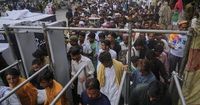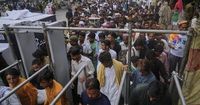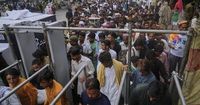Every August, the city of Lahore bursts into a whirlwind of color, sound, and devotion as it hosts one of South Asia’s most vibrant spiritual gatherings. On August 20, 2025, as the sun dipped behind the bustling streets, as many as one million devotees streamed into the heart of Lahore to mark the three-day Urs festival at the shrine of Hazrat Ali Hajveri, affectionately known as Data Ganj Bakhsh or Data Sahib. The annual festival, centuries old, honors the life and legacy of this revered mystic and scholar—an event that fuses faith, festivity, and deep-rooted tradition in a way few occasions can rival.
According to the Associated Press, the shrine—Data Darbar—transforms during Urs into a dazzling hub of faith, culture, and fraternity. The air thrums with the beat of drums, the swirl of dancers, and the glow of countless lights. Pilgrims arrive from every corner of Pakistan, many traveling for days, their hearts set on paying homage to the city’s patron saint. For three days, the shrine’s marble courtyards and narrow alleys are alive with a palpable energy, as processions wind their way through the crowds, worshippers recite Quranic verses, and ceremonial cloths are offered at Ali Hajveri’s grave.
But what makes this celebration so unique? It’s not just the scale—though a million strong crowd is nothing to sneeze at. It’s the way ancient rituals and communal spirit blend together, creating a tapestry of sights and sounds that captivate even the most casual onlooker. The festival’s centerpiece is the dhamaal—a ritual trance dance performed by spiritual devotees known as “Malangs.” Accompanied by thunderous drumming, dancers spin in circles, surrendering themselves to the rhythm until they reach a trance-like state. For many, it’s a moment of pure spiritual ecstasy, a physical expression of devotion that bridges the gap between the earthly and the divine.
“We have been coming here since my childhood, almost 40 years,” said Hussain Jilani, 57, his voice brimming with emotion as he stood among the throngs. “We feel spiritually fulfilled whenever we come. Data Sahib is a source of blessings. Whatever task we have gets resolved with his grace.” His words, reported by the Associated Press, echo the sentiments of generations who have made this pilgrimage a cornerstone of their faith. Another devotee, Saleem Tayyab, 63, added, “Our pockets have never been empty, and our hearts never without peace. Whoever comes here takes blessings with him.”
Ali Hajveri’s journey to becoming the city’s patron saint is as remarkable as the festival itself. Born in Ghazni, Afghanistan, in 990, he traveled through Iran, Iraq, and Syria, seeking out the leading Sufi masters of his era. Eventually, he settled in Lahore, where his teachings and spiritual guidance left an indelible mark on the city’s religious landscape. When he died in 1077, his tomb became a beacon for seekers of all backgrounds, and over the centuries, Data Darbar has grown into one of the busiest Sufi pilgrimage sites in South Asia.
During Urs, the shrine’s transformation is nothing short of spectacular. The Data Darbar complex, already a landmark in Lahore, becomes a place where boundaries blur—between rich and poor, young and old, urban and rural. The spirit of inclusivity is perhaps best embodied by the langar, or community kitchen, which serves free meals around the clock to all who enter. Volunteers work tirelessly, packing food for the endless stream of devotees, ensuring that no one leaves hungry. The aroma of freshly cooked rice and lentils mingles with the scent of incense, adding another layer to the sensory feast.
Devotional singing, or qawwali, fills the air as night falls. The hypnotic melodies and poetic lyrics, performed by renowned Sufi musicians, draw listeners into a shared experience of longing and love for the divine. For many, these songs are not just entertainment—they are prayers set to music, a way to connect with the saint’s enduring message of compassion and unity.
The rituals extend beyond music and food. Pilgrims touch the shrine’s intricate latticework, whispering prayers and seeking blessings. Some arrive in processions, carrying elaborately embroidered cloths to drape over the saint’s grave—a gesture of respect and devotion. Others simply sit in quiet contemplation, soaking in the atmosphere and reflecting on the teachings of Ali Hajveri, whose influence continues to shape the spiritual life of Lahore and beyond.
Security is tight, with checkpoints at the shrine’s entrances to ensure the safety of the massive crowds. Yet, even with such measures in place, the mood remains warm and welcoming. Strangers share meals, stories, and prayers, united by a common purpose: to honor a man whose life was dedicated to bridging divides and fostering understanding.
The Urs festival also serves as a powerful reminder of the enduring appeal of Sufi traditions in Pakistan. In a country often portrayed through the lens of political turmoil or sectarian strife, events like these highlight a different reality—one where spirituality, hospitality, and communal harmony take center stage. The festival’s emphasis on service, music, and collective worship offers a counterpoint to more rigid interpretations of faith, drawing people from all walks of life into its embrace.
For many attendees, the journey to Data Darbar is as much about seeking answers as it is about celebrating. Some come with hopes and prayers for health, prosperity, or peace; others simply wish to be part of something larger than themselves. The stories they carry—of hardship overcome, of blessings received—add to the rich tapestry of the festival, making each Urs a living testament to the enduring power of faith.
As the final day draws to a close, the crowds begin to thin, but the sense of fulfillment lingers. For devotees like Hussain Jilani and Saleem Tayyab, the pilgrimage is more than a yearly ritual—it’s a lifeline, a source of comfort and hope in an ever-changing world. “Whatever task we have gets resolved with his grace,” Jilani said, summing up the spirit of the event in a single sentence.
In Lahore, the legacy of Hazrat Ali Hajveri continues to shine as brightly as the thousands of lamps lit in his honor. Each year, Urs brings together a million voices in prayer, song, and celebration—a testament to the enduring power of tradition, and the unbreakable bonds of community and faith.



